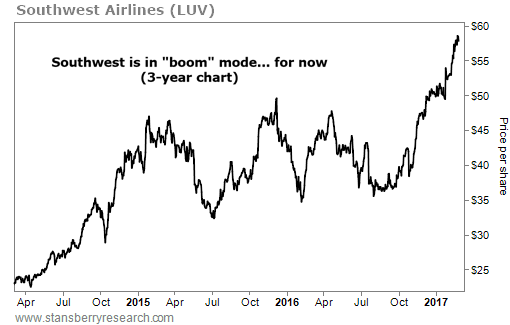| Home | About Us | Resources | Archive | Free Reports | Market Window |
Three Clues for Finding Companies That Jump off the PageBy
Thursday, March 2, 2017
It was an unusual research project...
Not one in 1,000 investment advisors or newsletter writers would ever consider it.
My research partner and I read every shareholder letter issued by companies in the S&P 500 Index.
I got the idea from billionaire superinvestor Warren Buffett. Several years ago, Buffett talked about a one-page fax he got from the CEO of a potential acquisition: The quality of the business, he said, "jumped off the page."
During our project, we found a few shareholder letters that were that good. And if you study what I'm about to teach you... you, too, will be able to identify companies that "jump off the page" as wonderful investments you'd like to own one day.
You won't have to pick stocks anymore. They'll pick you!
And it's easier than you think...
I found three valuable types of insight in the best shareholder letters...
The first and most important insight a great shareholder letter will give you is about the company's approach to cash... It's great to own a piece of a profitable company... But if the management team squanders the profits, they'll destroy shareholder value instead of preserving and growing it.
Take Wall Street mega-bank JPMorgan Chase (JPM), for example. To this longstanding member of the S&P 500, growing its dividend is the most important thing it does with excess cash – even more important than growing the business!
Here's the relevant passage from an annual shareholder letter by CEO Jamie Dimon...
The priorities for investing excess cash couldn't be clearer. First, JPMorgan will grow its dividend. Second, it will consider ways to grow the business. Third, it will look to spend cash in other ways, including buying back its stock. When you find the companies that allocate excess capital wisely – like JPMorgan has – well, I can't stress enough how highly valuable that is to you as an investor. It's like knowing who's going to win an Olympic gold medal before the event begins.
Second, great business leaders want to be held accountable. They want to give you, the shareholder, an objective benchmark for measuring their success.
Consider 3M (MMM), a conglomerate that produces everything from Post-it notes to welding goggles.
Its shareholder letter provides investors with a crystal-clear set of financial benchmarks they can refer to in the future to make sure management is performing well.
Here's what 3M Chairman and CEO Inge Thulin said in a shareholder letter...
Shareholders can note these objective benchmarks and know in five years if management is performing up to speed or not. Most shareholder letters don't do this. They aren't crystal clear about how to gauge success because they fear they won't measure up. But great management teams believe in what they're doing. They want to be held to an objective standard.
Humans are ego-driven. They want recognition... But they like their recognition to come with as little effort and commitment as possible. So it takes a special kind of person to draw a line in the sand and let the world know that's the point from which his future progress will be measured.
Many good shareholder letters contain one additional big idea. Simply put, you want a manager who can explain the industry he's in and what makes his company's approach to it different and better...
For example, here's a clear explanation of how and why apartment REIT Equity Residential (EQR) changed its business...
Letters like this – that explain the company and the industry in plain English – provide a free, high-quality (and sometimes entertaining) financial education that will take very little of your time. Those are just three examples of several great shareholder letters we read during our project. We found 79 that show the companies are dedicated to paying out their excess cash to shareholders... keeping themselves accountable... and explaining their business and industry in plain language.
Of course, there are great companies that don't have great shareholder letters. But it's hard to find the opposite – a really great shareholder letter that isn't written by a great CEO of a great business.
I've never heard about anyone undertaking a project like we did... But I believe in those kinds of "manual" methods of stock screening. It's easy for computerized screening tools to miss things an experienced human being carefully poring over the same data would find.
To be a great investor, you have to be willing to look at the stock market in ways most other people don't.
Reading the shareholder letters of the companies you invest in is invaluable when it comes to understanding the business, the industry, and what you can expect from your management team... especially when you find one that's sending the right message in a clear, credible way.
Good investing,
Dan Ferris
Further Reading:
"Investing is like breathing," Dan writes. "No one can do it for you." Learn which five skills he says you need to master to invest fearlessly right here.
Market NotesTHIS 'BOOM AND BUST' SECTOR IS IN BOOM MODE Today, we check in on one of the most volatile sectors in the market.
We're talking about airlines. Because of their razor-thin profit margins, exposure to swings in fuel costs, and massive capital expenditures required to keep their businesses running, airlines typically make for poor long-term investments. But they can also be traded for big profits when they enter "boom" mode.
That's what we're seeing right now. Consider shares of major airline Southwest Airlines (LUV). The $37 billion company is the largest domestic airline, serving more than 100 million customers annually in more than 100 locations in the U.S.
Right now, low oil prices have helped push Southwest shares to their highest level in more than 30 years. They're up more than 160% over the last three years alone. While things are in boom mode for this airline stock, it's important to remember that when it comes to airlines, "rent, don't buy."
 |
Recent Articles
|



